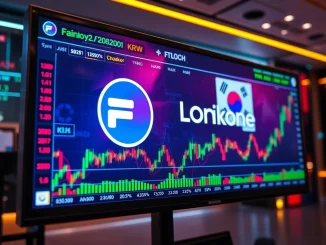
The cryptocurrency world is once again under the regulatory microscope as OKX, a prominent crypto exchange, finds itself in hot water. Malta’s Financial Intelligence Analysis Unit (FIAU) has slapped OKX with a significant regulatory fine of $1.2 million. This penalty stems from a 2023 compliance inspection that unearthed serious anti-money laundering (AML) violations. Are these lapses just minor hiccups, or do they signal a deeper systemic issue within OKX‘s operations? Let’s dive into the details of this developing story and understand what it means for the future of crypto exchanges and user trust.
What Exactly Happened with OKX and the Malta AML Fine?
According to a Bloomberg report, the FIAU’s inspection in 2023 uncovered multiple breaches of AML regulations. Authorities have labeled some of these violations as ‘serious and systemic,’ raising concerns about the robustness of OKX’s compliance framework. While the exact nature of these breaches hasn’t been fully disclosed, the severity of the fine and the language used by regulators suggest they are not trivial.
Here’s a breakdown of what we know so far:
- The Fine: OKX has been fined $1.2 million by Malta’s FIAU.
- Reason: AML compliance failures discovered during a 2023 inspection.
- Severity: Some breaches are described as ‘serious and systemic.’
- Location: The regulatory action is taken by Malta‘s financial intelligence unit.
- Impact: This marks another regulatory challenge for the global crypto exchange.
This incident serves as a stark reminder that even established crypto exchanges are not immune to regulatory scrutiny and the potential consequences of non-compliance. It also highlights the ongoing global effort to bring the crypto industry in line with traditional financial regulations, particularly concerning anti-money laundering.
Why is AML Compliance So Critical for Crypto Exchanges Like OKX?
Anti-Money Laundering (AML) compliance is not just a bureaucratic hurdle; it’s a cornerstone of a trustworthy and sustainable financial ecosystem. For crypto exchanges like OKX, robust AML measures are essential for several reasons:
- Combating Financial Crime: AML regulations are designed to prevent the use of financial systems for illicit activities like money laundering, terrorism financing, and fraud. Crypto exchanges, handling vast sums of digital assets, are potential conduits for such crimes if proper safeguards are not in place.
- Maintaining User Trust: Users need to have confidence that the platforms they use are secure and compliant. AML measures demonstrate a commitment to security and legitimacy, fostering trust among users and the broader public.
- Ensuring Regulatory Legitimacy: Operating in regulated jurisdictions like Malta requires strict adherence to AML laws. Failure to comply can lead to hefty fines, reputational damage, and even operational restrictions or license revocation.
- Promoting Mainstream Adoption: For cryptocurrencies to gain wider acceptance and integration into the mainstream financial system, they need to be perceived as safe and regulated. Strong AML compliance is a key step in achieving this legitimacy and attracting institutional investors and everyday users.
In essence, AML compliance is not just about avoiding fines; it’s about building a responsible and sustainable crypto industry.
What Could Be the ‘Serious and Systemic’ AML Failures at OKX?
While the FIAU hasn’t explicitly detailed the specific AML violations, ‘serious and systemic’ breaches often point to fundamental weaknesses in an organization’s compliance framework. These could potentially include:
- Inadequate Customer Due Diligence (CDD): Failing to properly verify the identity of customers and understand the nature of their transactions. This could involve weak Know Your Customer (KYC) procedures.
- Insufficient Transaction Monitoring: Not having effective systems to monitor transactions for suspicious activity and flag potentially illicit funds.
- Lack of Reporting Suspicious Activity: Failing to report suspicious transactions to the relevant authorities, as required by AML regulations.
- Weak Internal Controls: Deficiencies in internal policies, procedures, and oversight mechanisms designed to ensure AML compliance.
- Training and Awareness Gaps: Inadequate training for staff on AML requirements, leading to errors and oversights in compliance processes.
The ‘systemic’ nature suggests these aren’t isolated incidents but rather indicative of broader, organization-wide issues within OKX’s AML program.
Malta’s Stance on Crypto Regulation: A Closer Look
Malta, once hailed as a ‘Blockchain Island,’ has been refining its approach to crypto regulation. While initially welcoming to the industry, recent years have seen a tightening of regulatory oversight. This regulatory fine against OKX could signal a more assertive stance from Maltese authorities in enforcing compliance.
Key aspects of Malta’s crypto regulatory landscape include:
| Aspect | Details |
|---|---|
| Virtual Financial Assets Act (VFAA) | Provides a legal framework for crypto assets and related service providers in Malta. |
| Financial Intelligence Analysis Unit (FIAU) | Responsible for combating money laundering and terrorist financing, including oversight of crypto businesses. |
| Emphasis on AML/CFT Compliance | Malta prioritizes strong Anti-Money Laundering and Counter-Financing of Terrorism (AML/CFT) measures for crypto firms. |
| Adapting Regulatory Approach | Malta is evolving its regulatory framework to address emerging risks and ensure investor protection and market integrity. |
The fine against OKX demonstrates that Malta, while still aiming to be a crypto-friendly jurisdiction, is serious about enforcing its regulations and holding crypto exchanges accountable.
What Does This Fine Mean for OKX and the Crypto Industry?
This $1.2 million regulatory fine is more than just a financial penalty for OKX; it carries broader implications for the exchange and the entire crypto industry:
- Reputational Damage: News of AML failures can erode user trust and negatively impact OKX’s brand image, especially in a competitive market.
- Increased Regulatory Scrutiny: This incident may lead to heightened scrutiny from regulators globally, not just in Malta, for OKX and other major exchanges.
- Focus on Compliance: It serves as a wake-up call for all crypto exchanges to prioritize and invest in robust AML compliance programs. The cost of non-compliance, both financially and reputationally, can be substantial.
- Industry-Wide Impact: This event reinforces the narrative that crypto regulation is becoming increasingly stringent worldwide. Exchanges need to adapt to this evolving landscape to ensure long-term sustainability.
- User Awareness: For crypto users, this highlights the importance of choosing exchanges that demonstrate a strong commitment to regulatory compliance and user security.
The OKX fine in Malta is a significant event, underscoring the critical importance of AML compliance in the cryptocurrency space. It’s a stark reminder that regulatory oversight is intensifying, and exchanges must prioritize building robust compliance frameworks to operate successfully in this evolving environment.
Key Takeaways: Navigating the Evolving Crypto Regulatory Landscape
The OKX situation offers several crucial takeaways for everyone involved in the crypto world:
- Compliance is Non-Negotiable: AML and other regulatory compliance are not optional extras; they are fundamental requirements for operating a crypto exchange.
- Proactive Measures are Essential: Exchanges need to proactively invest in and continuously improve their compliance programs, rather than reacting to regulatory actions.
- Transparency and Communication Matter: Open communication and transparency with regulators and users are crucial for building trust and mitigating damage when compliance issues arise.
- Regulatory Landscape is Dynamic: The crypto regulatory landscape is constantly evolving. Exchanges must stay informed and adapt to new requirements to remain compliant.
- User Due Diligence is Important: Users should also play their part by choosing exchanges that prioritize regulatory compliance and security.
In conclusion, the $1.2 million fine against OKX in Malta is a shocking reminder of the serious consequences of AML failures in the crypto industry. It serves as a crucial lesson for exchanges worldwide and highlights the increasing importance of navigating the complex and evolving crypto regulation landscape with diligence and foresight. As the industry matures, robust compliance will be the bedrock of trust, sustainability, and mainstream adoption.



